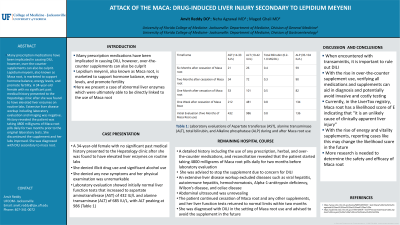Sunday Poster Session
Category: Liver
P1345 - Attack of the Maca: Drug-Induced Liver Injury Secondary to Lepidium meyenii
Sunday, October 27, 2024
3:30 PM - 7:00 PM ET
Location: Exhibit Hall E

Has Audio

Anvit D. Reddy, DO
University of Florida College of Medicine
Jacksonville, FL
Presenting Author(s)
Anvit D. Reddy, DO, Neha Agrawal, MD, Maged A.. Ghali, MD
University of Florida College of Medicine, Jacksonville, FL
Introduction: Drug-induced liver injury (DILI) is a common albeit serious adverse reaction to medications. Many prescription medications have been implicated in causing DILI, however, over-the-counter supplements can also be culprits. Lepidium meyenii, also known as Maca root, is marketed to support hormone balance, energy levels, and promote fertility. Here we present a case of abnormal liver enzymes which were ultimately able to be directly linked to the use of Maca root.
Case Description/Methods: A 34-year-old female with no significant past medical history presented to the Hepatology clinic after she was found to have elevated liver enzymes on routine labs. She denied illicit drug use and significant alcohol use. She denied any new symptoms and her physical examination was unremarkable. Laboratory evaluation showed initially normal liver function tests that increased to aspartate aminotransferase (AST) of 432 IU/L and alanine transaminase (ALT) of 685 IU/L, with ALT peaking at 986 (Table 1). A detailed history was obtained including the use of any prescription, herbal, and over-the-counter medications, and reconciliation revealed that the patient started taking 4800 milligrams of Maca root pills daily for two months before laboratory evaluation. She noted she was using it to boost her fertility. She was advised to stop the supplement due to concern for DILI. An extensive liver disease workup excluded diseases such as viral hepatitis, autoimmune hepatitis, hemochromatosis, Alpha-1-antitrypsin deficiency, Wilson’s disease, and celiac disease. Abdominal ultrasound was essentially unrevealing. The patient continued cessation of Maca root and any other supplements, and her liver function tests returned to normal limits within two months. She was diagnosed with DILI in the setting of Maca root use and advised to avoid the supplement in the future.
Discussion: When encountered with transaminitis, it is important to rule out DILI. With the rise in over-the-counter supplement use, verifying all medications and supplements can aid in diagnosis and potentially avoid invasive and costly testing. Currently, in the LiverTox registry, Maca root has a likelihood score of E indicating that “it is an unlikely cause of clinically apparent liver injury”. With the rise of energy and vitality supplements, reporting cases like this may change the likelihood score in the future. More research is needed to determine the safety and efficacy of Maca root.
Note: The table for this abstract can be viewed in the ePoster Gallery section of the ACG 2024 ePoster Site or in The American Journal of Gastroenterology's abstract supplement issue, both of which will be available starting October 27, 2024.
Disclosures:
Anvit D. Reddy, DO, Neha Agrawal, MD, Maged A.. Ghali, MD. P1345 - Attack of the Maca: Drug-Induced Liver Injury Secondary to Lepidium meyenii, ACG 2024 Annual Scientific Meeting Abstracts. Philadelphia, PA: American College of Gastroenterology.
University of Florida College of Medicine, Jacksonville, FL
Introduction: Drug-induced liver injury (DILI) is a common albeit serious adverse reaction to medications. Many prescription medications have been implicated in causing DILI, however, over-the-counter supplements can also be culprits. Lepidium meyenii, also known as Maca root, is marketed to support hormone balance, energy levels, and promote fertility. Here we present a case of abnormal liver enzymes which were ultimately able to be directly linked to the use of Maca root.
Case Description/Methods: A 34-year-old female with no significant past medical history presented to the Hepatology clinic after she was found to have elevated liver enzymes on routine labs. She denied illicit drug use and significant alcohol use. She denied any new symptoms and her physical examination was unremarkable. Laboratory evaluation showed initially normal liver function tests that increased to aspartate aminotransferase (AST) of 432 IU/L and alanine transaminase (ALT) of 685 IU/L, with ALT peaking at 986 (Table 1). A detailed history was obtained including the use of any prescription, herbal, and over-the-counter medications, and reconciliation revealed that the patient started taking 4800 milligrams of Maca root pills daily for two months before laboratory evaluation. She noted she was using it to boost her fertility. She was advised to stop the supplement due to concern for DILI. An extensive liver disease workup excluded diseases such as viral hepatitis, autoimmune hepatitis, hemochromatosis, Alpha-1-antitrypsin deficiency, Wilson’s disease, and celiac disease. Abdominal ultrasound was essentially unrevealing. The patient continued cessation of Maca root and any other supplements, and her liver function tests returned to normal limits within two months. She was diagnosed with DILI in the setting of Maca root use and advised to avoid the supplement in the future.
Discussion: When encountered with transaminitis, it is important to rule out DILI. With the rise in over-the-counter supplement use, verifying all medications and supplements can aid in diagnosis and potentially avoid invasive and costly testing. Currently, in the LiverTox registry, Maca root has a likelihood score of E indicating that “it is an unlikely cause of clinically apparent liver injury”. With the rise of energy and vitality supplements, reporting cases like this may change the likelihood score in the future. More research is needed to determine the safety and efficacy of Maca root.
Note: The table for this abstract can be viewed in the ePoster Gallery section of the ACG 2024 ePoster Site or in The American Journal of Gastroenterology's abstract supplement issue, both of which will be available starting October 27, 2024.
Disclosures:
Anvit Reddy indicated no relevant financial relationships.
Neha Agrawal indicated no relevant financial relationships.
Maged Ghali: Gilead – Grant/Research Support. Madrigal – Grant/Research Support. Novo Nordisk – Grant/Research Support.
Anvit D. Reddy, DO, Neha Agrawal, MD, Maged A.. Ghali, MD. P1345 - Attack of the Maca: Drug-Induced Liver Injury Secondary to Lepidium meyenii, ACG 2024 Annual Scientific Meeting Abstracts. Philadelphia, PA: American College of Gastroenterology.
